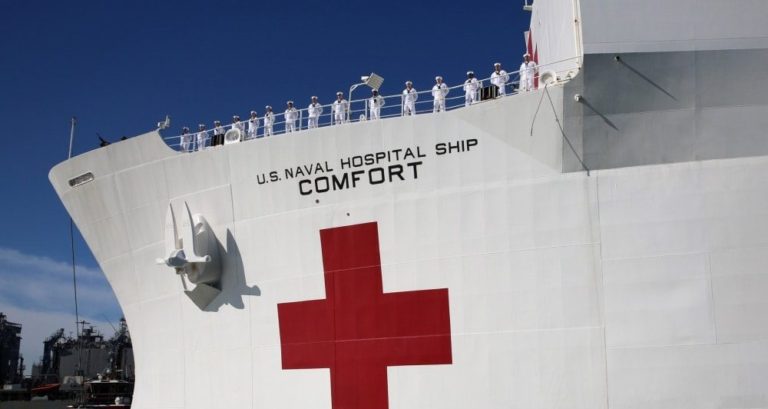The Pentagon announced this week that two U.S. Navy hospital ships will be mobilized to support civilian health systems battling coronavirus disease. The ships will provide acute care for uninfected patients, with a focus on trauma care.
The USNS Comfort, which is now undergoing maintenance in Norfolk, Virginia, will deploy to New York City. The USNS Mercy is currently stationed in San Diego. Its destination has yet to be determined, but it will likely deploy to a port on the West Coast.
Each ship has an inpatient capacity of 1,000 beds. Mercy is expected to set sail during the week of March 23. The Department of Defense (DOD) did not specify when Comfort will be ready to mobilize.
During a March 19 press conference at the Pentagon, Navy Surgeon General Rear Adm. (Dr.) Bruce L. Gillingham said the ships “will help take some of the burden off of local hospitals so that they can focus on COVID-19 care.”
According to a report from the DOD, Gillingham said the crews of Comfort and Mercy will be using their skills as “world-class trauma specialists.” He said they will be available to treat patients from the community who suffer traumatic injuries.
Operating concept still developing
During the Pentagon press conference, Gillingham said the operating plan for the hospital ships is still under development.
“What worked very well in Puerto Rico when Comfort was activated for Hurricane Maria is that the ship functioned as a referral center, so essentially a tertiary care center,” he said.
During that mission, Comfort worked with a network of local health officials to prioritize care. In their new deployments, the ships will likely receive patients after they have been triaged by local hospitals.
“I do envision … that it will be patients who are already hospitalized or who would have come into an emergency room and that they would be transported to the hospital ship,” Gillingham said.
He added that all patients transported to the hospital ships will be screened for COVID-19.
Not a typical mission
“We’re honored to serve,” Gillingham said. “And although this is not our traditional medical mission, which typically involves combat casualty care, I believe these efforts demonstrate our agility and responsiveness to do what the country asks, wherever and whenever we’re needed.”

